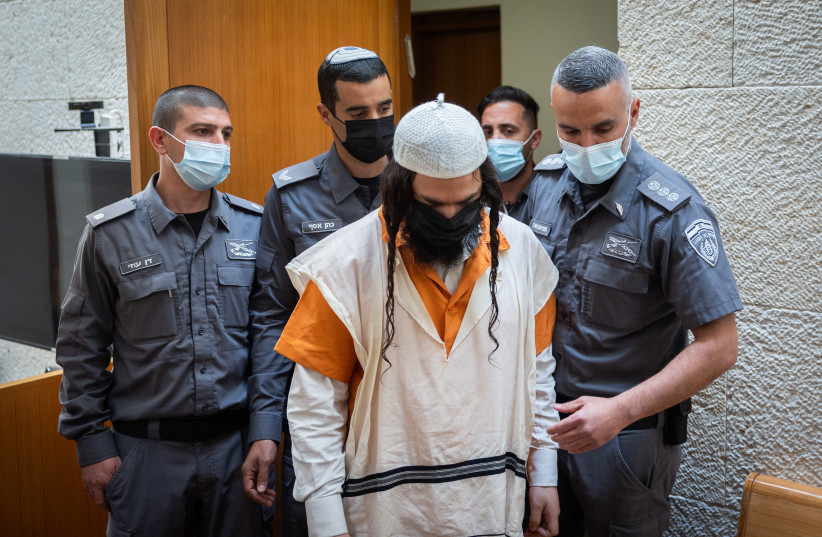Sometimes, dangers to human rights and democracy become more serious from seeming moderates who try to sneak extremist views into the mainstream.
Religious Zionist MK Simcha Rothman may have just crossed this line when he seemed to support convicted Jewish terrorist Amiram Ben Uliel.
Some of the responses to the Supreme Court’s rejection on Thursday of Ben Uliel’s appeal of his three life sentences for the 2015 murders of the Dawabshe family in Duma were predictable.
Before he could have read the court’s full opinion, MK Itamar Ben-Gvir accused the court and the judiciary of being “disconnected,” “supporting a certain agenda,” and of harboring “hatred.”
These statements are not surprising from Ben-Gvir, who has yet to find a Jew – convicted of harming Palestinians – who he does insist is innocent or misunderstood.

But Rothman knows better. He has written a serious, scholarly book about what he views as an overreach by the Supreme Court in a variety of policy arenas, something which has won him attention as a profound thinker of Israel’s Right and of conservatism.
Recently, Rothman was hosted at a large Tikvah conference in the US on conservatism as a sort of Israeli version to parallel conservative judicial philosophy in the US.
And until Thursday, Rothman could have been mistaken for being considered such an intellectual.
But conservative judicial philosophy in the US sticks to policy and does not try to defend terrorists or insurgents. Conservative judges have, for example, supported prosecutions of the January 6 rioters – none of whom burned a whole family alive.
Rothman’s tactic did show his cleverness. “I don’t know whether Amiram Ben Uliel perpetrated the Duma murder or not,” he wrote. “I know that a system of justice, which approves confessions given after torture, is not fit to be called a just system.”
His comments seemed innocent. He did not say that Ben Uliel was free of blame, or that he approves of violence against Palestinians. He was querying the evidence.
And maybe this might be appropriate to say if Ben Uliel’s trial was only starting now, since everyone is innocent until proven guilty. Except that whether Ben Uliel is innocent or guilty is no longer in doubt.
Ben Uliel’s trial lasted nearly five years, during which both sides presented extensive evidence and witnesses.
The rule of law is the bedrock of democracy, and Rothman knows this
When Rothman is questioning the future of Israel’s justice system, he knows perfectly well that the bedrock of any democracy is the rule of law.
And it is not that the court did not understand the issues. In fact, the court took the almost unprecedented step of disqualifying multiple confessions that Ben Uliel made within 36 hours of the “enhanced” interrogations.
Hundreds of Palestinians would be desperate to get the same sympathetic treatment in Israeli courts and yet, despite disqualifying those confessions, there were enough later confessions, reconstructions and external evidence for the court to unanimously convict Ben Uliel.
In a panel with two clearly conservative justices – Yosef Elron and Shaul Shochet – and one moderate, Yitzhak Amit, the Supreme Court took Ben Uliel’s claims seriously, weighed them but still found the evidence too compelling to acquit him. This was not a ruling by liberal justices.
Not only were the majority of justices who convicted Ben Uliel conservative, but the Shin Bet chief who thought it was necessary to use enhanced interrogation was none other than politically right-wing Yoram Cohen. The prime minister at the time was Benjamin Netanyahu.
Rothman knows all this – from the serious analysis, the courts at both levels gave, to the conservative bona fides of the justices to those who authorized and permitted the enhanced interrogation in real-time.
If Rothman was ready to criticize all enhanced interrogation like the Public Committee Against Torture – including against Palestinians – this would be a defensible position.
But he would never do this. According to Rothman, a Jew accused of violence is innocent even after conviction and after all appeals are exhausted, but for Palestinians it is different.
Rothman’s statement does not promote a fight against torture in the State of Israel, rather, it is a back door to legitimizing extremist Jewish violence against innocent Palestinians.
